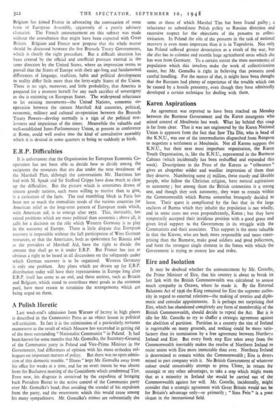E .R .P. Difficulties
It is unfortunate that the Organisation for European Economic Co- operation has not been able to decide how to divide among the recipients the resources that are due under the next instalment of the Marshall Plan, although the conversations Mr. Harriman has had with M. Spaak and Sir Stafford Cripps have done much to clear up the difficulties. But the picture which is sometimes drawn of sixteen greedy nations, each more willing to receive than to give, is a caricature of the facts. The real stumbling block in Paris has been not so much the immediate needs of the various countries for American relief as the long-term pattern of European trade which, with American aid, is to emerge after 1952. This, inevitably, has raised problems which are more political than economic ; above all, it calls for a decision on the role which Western Germany is to play in the economy of Europe. There is little dispute that European recovery is impossible without the full participation of West German resources, or that the Americans, both as spokesmen for Bizonia and as the providers of Marshall Aid, have the right to decide the amount that shall go to it under E.R.P. But France has just as obvious a right to be heard in all discussions on the safeguards under which German recovery is to be organised. Western Germany is only one problem. Any plans which are drawn up for E.R.P. distribution today will have their repercussions in Europe long after E.R.P. itself has come to an end, and those nations, such as Britain and Belgium, which stand to contribute most goods to the common pool, have most reason to scrutinise the arrangements which are being urged on them.


































 Previous page
Previous page